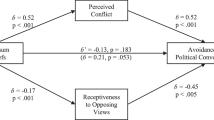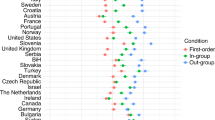Abstract
Effective communication can help increase bipartisan support for renewable energy. Prior research suggests that support for renewable energy may be determined, in part, by which of its benefits are emphasized. Here we use a three-stage, longitudinal experiment (N = 2,891) to compare the immediate and over-time effects of three informational frames of renewable energy’s benefits (cost savings, economy boost and global warming mitigation). We tested each message’s effects on US Democrats’ and Republicans’ beliefs about and support for renewable energy, and we compared the longevity of these effects over a period of three weeks. We find that cost savings was the most effective frame—both in terms of immediate effect size on beliefs and in the longevity of those effects—with negligible differences between political groups. The durability of all effects exhibited a consistent pattern: an initial steep drop in effect size followed by a plateau.
This is a preview of subscription content, access via your institution
Access options
Access Nature and 54 other Nature Portfolio journals
Get Nature+, our best-value online-access subscription
$29.99 / 30 days
cancel any time
Subscribe to this journal
Receive 12 digital issues and online access to articles
$119.00 per year
only $9.92 per issue
Buy this article
- Purchase on Springer Link
- Instant access to full article PDF
Prices may be subject to local taxes which are calculated during checkout




Similar content being viewed by others
Data availability
The datasets used for this study (all three time points) are available on the Open Science Framework (https://osf.io/6cf93/) as Statistical Package for the Social Sciences (SPSS) data files (.sav). Alternative data formats are available from the corresponding author upon reasonable request.
References
IPCC Climate Change 2021: The Physical Science Basis (eds Masson-Delmotte, V. et al) (Cambridge Univ. Press, 2021).
Stokes, L. C. & Warshaw, C. Renewable energy policy design and framing influence public support in the United States. Nat. Energy 2, 17107 (2017).
Rabe, B. G. Can We Price Carbon? American and Comparative Environmental Policy (MIT Press, 2018).
Stokes., L. C. The politics of renewable energy policies: the case of feed-in tariffs in Ontario, Canada. Energy Policy 56, 490–500 (2013).
Bayulgen, O. & Benegal, S. Green priorities: how economic frames affect perceptions of renewable energy in the United States. Energy Res. Social Sci. 47, 28–36 (2019).
Bolsen, T., Druckman, J. N. & Cook, F. L. How frames can undermine support for scientific adaptations: politicization and the status-quo bias. Public Opin. Q. 78, 1–26 (2014).
Ansolabehere, S. & Konisky, D. M. Cheap and Clean: How Americans Think about Energy in the Age of Global Warming (MIT Press, 2014).
Scrase, J. I. & Ockwell, D. G. The role of discourse and linguistic framing effects in sustaining high carbon energy policy—an accessible introduction. Energy Policy https://doi.org/10.1016/j.enpol.2009.12.010 (2010).
Chong, D. & Druckman, J. N. Framing theory. Annu. Rev. Political Sci. 10, 103–126 (2007).
Druckman, J. N. The implications of framing effects for citizen competence. Political Behav. 23, 225–256 (2001).
Entman, R. M. Framing: toward clarification of a fractured paradigm. J. Commun. 43, 51–58 (1993).
Bernauer, T. & Mcgrath, L. F. Simple reframing unlikely to boost public support for climate policy. Nat. Clim. Change 6, 680–683 (2016).
Bain, P. G., Hornsey, M. J., Bongiorno, R. & Jeffries, C. Promoting pro-environmental action in climate change deniers. Nat. Clim. Change 2, 600–603 (2012).
Clarke, C. E. et al. Public opinion on energy development: the interplay of issue framing, top-of-mind associations, and political ideology. Energy Policy 81, 131–140 (2015).
Feinberg, M. & Willer, R. Apocalypse soon? Dire messages reduce belief in global warming by contradicting just-world beliefs. Psychol. Sci. 22, 34–38 (2011).
Myers, T. A., Nisbet, M. C., Maibach, E. W. & Leiserowitz, A. A. A public health frame arouses hopeful emotions about climate change. Climatic Change 113, 1105–1112 (2012).
Nisbet, M. C. Communicating climate change: why frames matter for public engagement. Environment 51, 12–23 (2009).
Dixon, G., Hmielowski, J. & Ma, Y. Improving climate change acceptance among U.S. conservatives through value-based message targeting. Sci. Commun. 39, 520–534 (2017).
Andre, H. Value orientation and framing as determinants of stated willingness to pay for eco-labeled electricity. Energy Effic. 4, 185–192 (2011).
Mills, S. B., Rabe, B. G. & Borick, C. Widespread Public Support for Renewable Energy Mandates Despite Proposed Rollbacks (Center for Local, State, and Urban Policy, 2015); https://closup.umich.edu/issues-in-energy-and-environmental-policy/22/widespread-public-support-for-renewable-energy-mandates-despite-proposed-rollbacks
Gray, M., Ljungwaldh, S., Watson, L. & Kok, I. Powering Down Coal: Navigating the Economic and Financial Risks in the Last Years of Coal Power (Carbon Tracker Initiative, 2019); https://carbontracker.org/reports/coal-portal/
Renewable Power Generation Costs in 2019 (International Renewable Energy Agency, 2020); https://www.irena.org/publications/2020/Jun/Renewable-Power-Costs-in-2019
Tversky, A. & Kahneman, D. The framing of decisions and the psychology of choice. Science 211, 453–458 (1981).
Tversky, A. & Kahneman, D. Loss aversion in riskless choice: a reference-dependent model. Q. J. Econ. 106, 1039–1061 (1991).
McCright, A. M. & Dunlap, R. E. The politicization of climate change and polarization in the American public’s views of global warming, 2001–2010. Sociological Q. 52, 155–194 (2011).
Guber, D. L. A cooling climate for change? Party polarization and the politics of global warming. Am. Behav. Sci. 57, 93–115 (2013).
Bergquist, P., Konisky, D. M. & Kotcher, J. Energy policy and public opinion: patterns, trends and future directions. Prog. Energy 2, 032003 (2020).
Bergquist, P., Mildenberger, M. & Stokes, L. C. Combining climate, economic, and social policy builds public support for climate action in the US. Environ. Res. Lett. 15, 054019 (2020).
Benjamin, D., Por, H.-H. & Budescu, D. Climate change versus global warming: who is susceptible to the framing of climate change? Environ. Behav. 49, 745–770 (2017).
Gustafson, A. et al. Republicans and Democrats differ in why they support renewable energy. Energy Policy 141, 111448 (2020).
Lecheler, S. & De Vreese, C. D. How long do news framing effects last? A systematic review of longitudinal studies. Ann. Int. Commun. Assoc. https://doi.org/10.1080/23808985.2015.11735254 (2016).
Coppock, A., Ekins, E. & Kirby, D. The long-lasting effects of newspaper op-eds on public opinion. Q. J. Political Sci. 13, 59–87 (2018).
Feldman, L. & Hart., P. S. Climate change as a polarizing cue: framing effects on public support for low-carbon energy policies. Glob. Environ. Change 51, 54–66 (2018).
Schuldt, J. P., Konrath, S. H. & Schwarz, N. “Global warming” or “climate change”?: whether the planet is warming depends on question wording. Public Opin. Q. 75, 115–124 (2011).
Edwards, K. & Smith, E. E. A disconfirmation bias in the evaluation of arguments. J. Personal. Soc. Psychol. 71, 5–24 (1996).
Taber, C. S. & Lodge, M. Motivated skepticism in the evaluation of political beliefs. Am. J. Political Sci. 50, 755–769 (2006).
Coppock, A. E. Positive, Small, Homogeneous, and Durable: Political Persuasion in Response to Information. PhD thesis, Columbia Univ. (2016).
Guess, A. & Coppock, A. Does counter-attitudinal information cause backlash? Results from three large survey experiments. Br. J. Political Sci. 50, 1497–1515 (2020).
Coppock, A., Hill, S. J. & Vavreck, L. The small effects of political advertising are small regardless of context, message, sender, or receiver: evidence from 59 real-time randomized experiments. Sci. Adv. 6, 40–46 (2020).
Bayer, P. & Ovodenko, A. Many voices in the room: a national survey experiment on how framing changes views toward fracking in the United States. Energy Res. Soc. Sci. 56, 101213 (2019).
van der Linden, S., Leiserowitz, A. & Maibach, E. The gateway belief model: a large-scale replication. J. Environ. Psychol. 62, 49–58 (2019).
Hart, P. S. & Feldman, L. Would it be better to not talk about climate change? The impact of climate change and air pollution frames on support for regulating power plant emissions. J. Environ. Psychol. 60, 1–8 (2018).
Paternoster, R., Brame, R., Mazerolle, P. & Piquero, A. Using the correct statistical test for the equality of regression coefficients. Criminology 36, 859–866 (1998).
Broockman, D. E., Kalla, J. L. & Sekhon, J. S. The design of field experiments with survey outcomes: a framework for selecting more efficient, robust, and ethical designs. Political Anal. 25, 435–464 (2017).
Gerber, A. S. & Green, D. P. Field Experiments: Design, Analysis, & Interpretation (WW Norton, 2012).
Cumming, G. Inference by eye: reading the overlap of independent confidence intervals. Stat. Med. 28, 205–220 (2009).
Acknowledgements
This study was supported by the Energy Foundation, Heising–Simons Foundation, 11th Hour Project and the MacArthur Foundation. The authors thank N. Kirsch for assisting with the literature review. The design and analyses of study were greatly improved by ideas and insights from A. Coppock and M. Ballew.
Author information
Authors and Affiliations
Contributions
A.G. conceptualized the study and methodology. M.H.G., P.B., K.L., S.A.R. and A.L. advised on the study’s concept, design, measures and stimuli. A.G. and M.H.G. collected the data. A.G., M.H.G. and P.B. analysed the data. A.G. wrote the original draft, with contributions and revisions from M.H.G., P.B., K.L., S.A.R. and A.L. A.L. obtained funding for the project.
Corresponding author
Ethics declarations
Competing interests
The authors declare no competing interests.
Peer review
Peer review information
Nature Energy thanks the anonymous reviewers for their contribution to the peer review of this work.
Additional information
Publisher’s note Springer Nature remains neutral with regard to jurisdictional claims in published maps and institutional affiliations.
Supplementary information
Supplementary Information
Supplementary study details, analyses and results.
Rights and permissions
Springer Nature or its licensor holds exclusive rights to this article under a publishing agreement with the author(s) or other rightsholder(s); author self-archiving of the accepted manuscript version of this article is solely governed by the terms of such publishing agreement and applicable law.
About this article
Cite this article
Gustafson, A., Goldberg, M.H., Bergquist, P. et al. The durable, bipartisan effects of emphasizing the cost savings of renewable energy. Nat Energy 7, 1023–1030 (2022). https://doi.org/10.1038/s41560-022-01099-2
Received:
Accepted:
Published:
Issue Date:
DOI: https://doi.org/10.1038/s41560-022-01099-2



